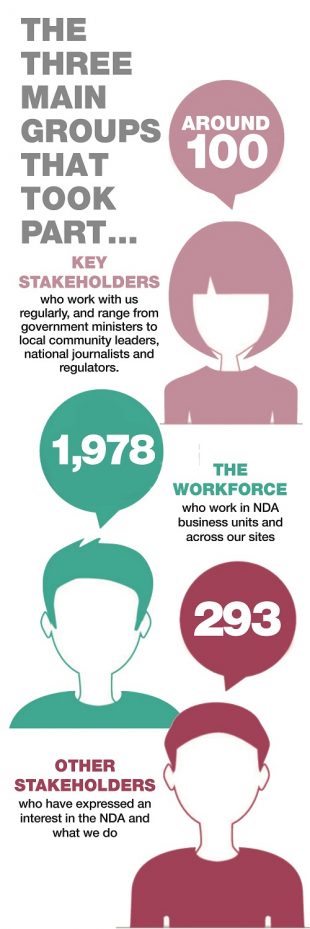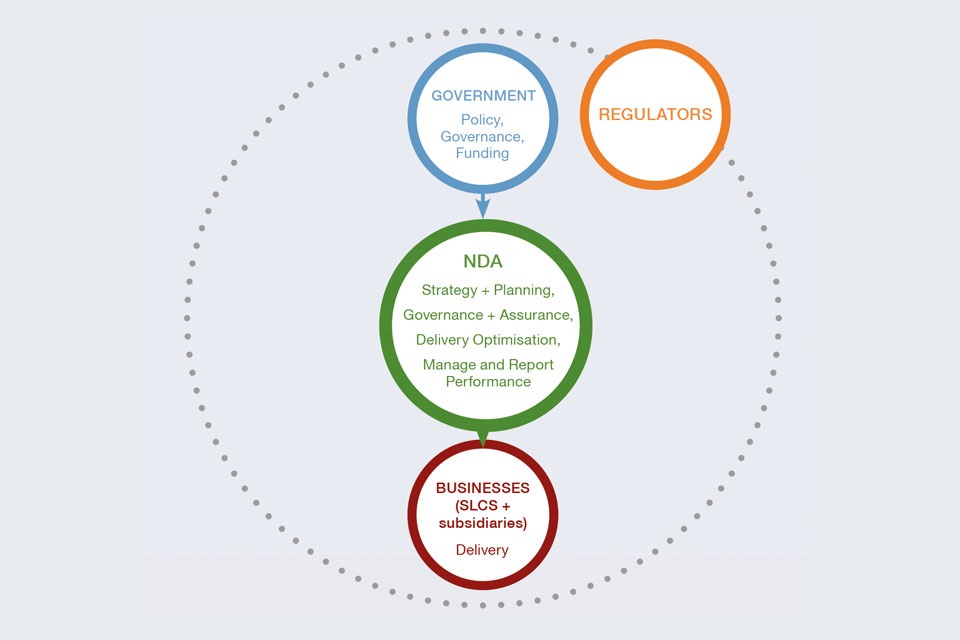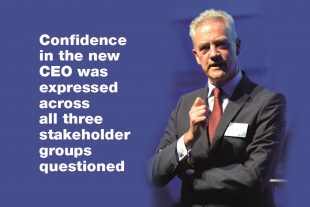
Earlier this year, we spent some time finding out what people thought about progress in decommissioning the UK’s earliest nuclear sites and how they perceive us, the organisation leading this mission.
Working with people who are interested in our clean-up mission is important to us. Understanding what people think about our work helps clarify where we are succeeding, and where we can improve. So this independent study gives us a clear benchmark to enable us to work better.
We have, of course, carried out surveys in the past but this one was more comprehensive, totally independent and forms part of a longer programme of work to improve our performance in all areas.
Who took part in the survey?
 Three main groups were invited to take part in the study.
Three main groups were invited to take part in the study.
Key stakeholders
The smallest group of respondents were 106 people who we tend to know quite well. They are generally actively interested in or regularly involved with the NDA. These individuals range from government ministers to local community leaders, national journalists and regulators.
The workforce
The second group is ‘the workforce’ and covers staff from all our sites and subsidiary organisations. Out of the 16,000 employed, 1,978 responded to the survey.
Other stakeholders
The third group was 293 people who have expressed an interest in the NDA and what we do. They accessed a link to the survey on our website, via our social media channels or through subscription to our e-newsletter.
Let’s look at some findings
The NDA’s role is generally well understood
Positive responses were received from:
- 98% of key stakeholders
- 87% of other stakeholders
- 70% of the workforce
Although the vast majority agreed that they understood the NDA’s role, a few stakeholders were slightly confused about the distinction between the role of the NDA and other related organisations such as the Department of Business, Energy and Industrial Strategy (BEIS), Site Licence Companies and Radioactive Waste Management (RWM).
The diagram shows the different relationships between the organisations.

Importance of the NDA in nuclear clean-up
The NDA’s role is seen as important by:
- 95% of key stakeholders
- 78% of other stakeholders
- 60% of the workforce
Many respondents described the NDA as playing a vital role in nuclear clean-up.
NDA effectiveness
At an overall level, many respondents felt the NDA was effective at:
- engaging with stakeholders (51%)
- directing funding and allocating budgets across its estates (48%)
- reporting on its performance to stakeholders (47%)
- holding to account those delivering work at its sites (45%)
Slightly fewer felt NDA was effective at:
- investing in skills initiatives (42%)
- investing in research and technological developments to drive innovation (41%)
- helping to grow a strong supply chain (38%)
- finding new and better ways of managing radioactive waste (37%)
However we scored poorly on ‘value for money’:
- only a quarter felt the NDA was effective at achieving value for money across its estate (25%)
- nearly half (48%) felt the NDA was ineffective in this area
Across all the effectiveness measures, the views of the workforce were more negative than those of the key stakeholder and other respondents. We will consider why this should be the case.
Negative comments focused on the Magnox court case and eventual termination of the contract.
Many thought that the nuclear clean-up would be much slower or may not even exist without the NDA.
Some described the NDA as essential and expressed their support for how we are progressing in our mission.
Highest standards of safety, security and environmental responsibility
Overall, just over two thirds of respondents (69%) agreed that the NDA maintains the highest standards of safety, security and environmental responsibility across our estate, with only 10% disagreeing.
NDA leadership
Overall, respondents were fairly split on the issue of whether they had confidence in the NDA’s leadership:
- just under a third had confidence in the leadership (29%)
- over a third did not have confidence (36%)
- similar proportion (35%) were neutral

Despite the results above, however, the majority of stakeholders across all three groups (54%) expressed confidence in the new CEO, David Peattie.
Trust in the NDA

Again, on the question of trust, those questioned were evenly split along similar lines to the leadership question with 58% of key stakeholders agreed they trust NDA, slipping to 31% for workforce respondents agreeing that they trust NDA.
Is the NDA the “best it can be”?
On being asked if the NDA “is the best it can be”, a majority (57%) of all stakeholders disagreed.
Some felt the NDA is a reasonably well-run organisation, considering the complex task it has. The general consensus was that there is always room for improvement and that organisations such as the NDA should always be striving for better.
Progress in the mission
The penultimate question asked respondents to rate the progress the NDA has made towards its mission.
- Overall, 42% felt that progress had been good
- 28% felt it had been poor
There was a disparity between the views of key stakeholders and workforce respondents, with 64% of key stakeholders scoring progress as good compared to 39% of the workforce respondents.
Qualitative responses included praise for:
- NDA for bringing understanding and clarity to the scope of complexity of work which needs to be undertaken
- NDA’s sophisticated approach and strategy development to managing waste and addressing many multi-faceted challenges
Suggestions for improvements
The last question invited respondents to identify one thing the NDA could do to enhance its reputation amongst stakeholders.
Suggestions included:
- improve communications, featuring the progress and good news stories
- be more open and transparent about what NDA is doing so that stakeholders have an accurate, realistic perspective of the organisation and its work
- take stakeholders views on board and listen to feedback
- connect staff and stakeholders through a knowledge management portal
- work with local authorities and local government groups in better ways, reaching out to those not involved in the established site stakeholder groups
Thank you to all who responded
So, if you responded to this survey, thank you for your views, which will help me shape the stakeholder engagement plans for NDA in the future.
Please do continue to share your views through comments on this blog and on our social media channels, as well as at our events.
We are committed to being an open and transparent organisation that shares plans and reports on performance in the mission to clean up some of the UK’s earliest nuclear sites. We’ll be improving how we do this based on the feedback we’ve received.
Keep up to date with our progress
To keep up to date with progress, please sign up to our e-bulletin
2 comments
Comment by Dr Ashok Patel posted on
I am not surprised with this outcome. The workforce group feedback is the most significant to listen to as they have the most appropriate knowledge to make an informed judgement rather than the 'Key Stakeholders' or the 'Others' groups, who have some vested interest and not enough understanding of the complex issues including how the solutions are formed, funded and optimised.
Overall, it is the contracting methodology imported from the US DOE model (by the Government Advisors - Bechtel) is at fault rather than the NDA as an Organisation (although there are some highly expensive mistakes made within the NDA decision making by some high powdered individuals (??) in post).
The NDA need to understand that the decision making on issues is best done by the 'person/organisation' with the 'most knowledge of the issues' in question, this is the 'SLCs and the workforce' and not 'others'. Despite a common belief to the contrary, the workforce is committed to reduce the cost to UK tax payers. Therefore, a process needs to be found which allows the decision making to the ' the SCLs and the workforce' on what is needed and how to achieve it.
The best role the NDA could have (inevitably required because the Government department can't deal with everything from within, the departments can be too close to the politics of the day and a more independent long term view is required) is to hold 'SCLs/workforce to account' on the 'spend and progress' promised.
Comment by Bill Hamilton posted on
Thank you very much for your comment on the survey. You raise some very interesting issues, some of which we are grappling with right now. Our workforce is highly skilled and experienced and we and our Business Unit management teams are always keen to engage and learn.
We have learnt lessons since our inception thirteen years ago and made changes where required to our operating model in the light of experience. We will continue to learn and strive to be the best we can be. I agree that a key role for the NDA is to hold our SLCs to account on progress and how they are spending taxpayers money. Our Annual Report is published in Parliament and open for scrutiny by anyone interested in what we do.